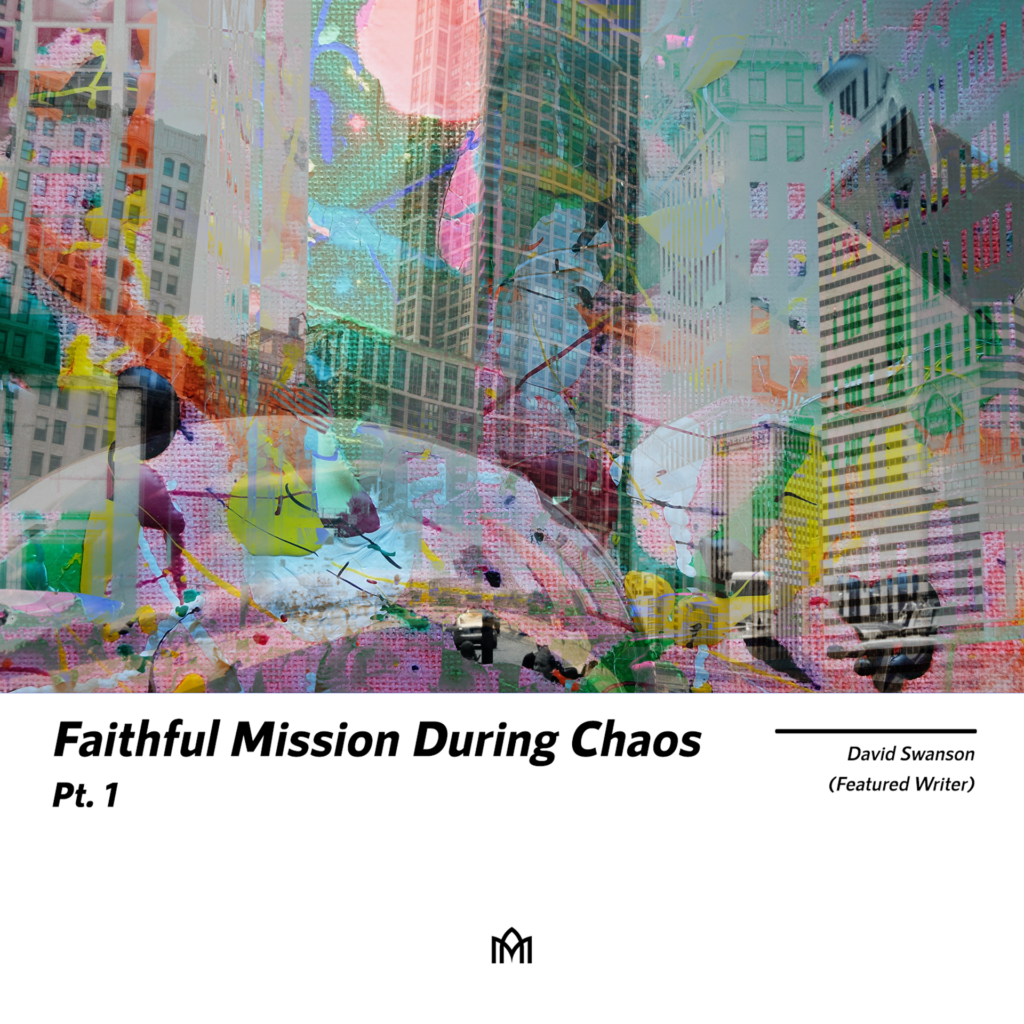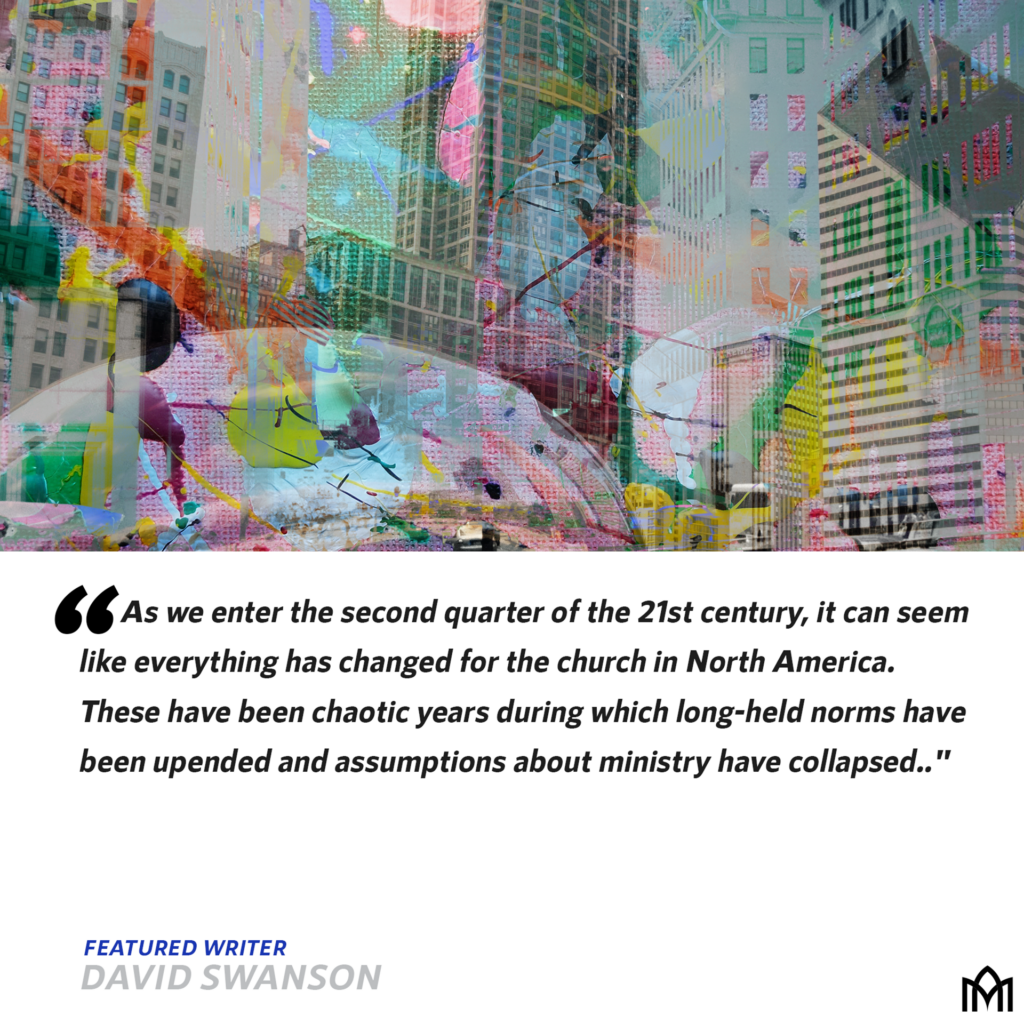Faithful Mission Through The Chaos (Part 1)

Holistic Mission
On March 17, 2020, everything changed for our family. That was the day Chicago’s mayor, following a mandate from the governor, suspended all schools in Illinois in response to a quickly spreading pandemic whose deadly reach had gripped our city. For the next many months, our routines were disrupted dramatically. Both of our sons, in elementary and middle school at the time, shifted to online classes. My wife had recently started graduate school and found that her long-held expectations about classrooms filled with eager students had to be abandoned. And I, a pastor on the South Side of Chicago, found myself preaching to a camera whose internet connection to our scattered congregation might drop at any moment.
It seemed that everything had changed for our family during those chaotic days of the first Covid-19 wave. In truth, the essential commitments we shared with each other and the things that mattered most to us remained the same. For example, despite our boys’ protests whenever we suggest a family walk through the neighborhood, our family has always enjoyed time together outdoors, whether a quick bike ride to Lake Michigan or hikes through national parks during a cross-country roadtrip. Often during those unprecedented months of lockdown, after the rest of the family had muddled through their asynchronous assignments, we jumped in the car and drove an hour to the Indiana National Lakeshore for a hike through a forest, over a dune, and onto a windswept beach. Though the world around us was chaotic, and though our routines and expectations had been upended, our little family found ways to nurture what was most important to us.
As we enter the second quarter of the 21st century, it can seem like everything has changed for the church in North America. These have been chaotic years during which long-held norms have been upended and assumptions about ministry have collapsed. The #churchtoo movement revealed persistent sexism and abuse perpetrated against women by many male pastors and ministry leaders. Nationalistic God-and-Country assumptions have infiltrated and spread through many congregations. Church attendance continues to decline even as, in a surprising reversal, more young men than women are affiliating with local churches. Many Christians of color have grown increasingly wary of evangelicals even as some non-Christians have adopted the label as a political identity. The re-inaugurated U.S. president can count on unwavering support from a majority of white Christians despite his criminal conviction, numerous sexual assaults, and continued xenophobic and racist inclinations.
Undoubtedly, you could easily add your own examples of the chaos roiling North American Christianity as well.
As we enter the second quarter of the 21st century, everything has changed for the church in North America. These have been chaotic years during which long-held norms have been upended and assumptions about ministry have collapsed. Share on X
Of course, as with my family’s core commitments during the pandemic, the essence of the church’s mission remains the same during seasons of unpredictability. Beginning in the early 1970’s, Latin American theologians such as René Padilla, Samuel Escobar, and Orlando Costas began writing and teaching about misión integral, or holistic mission, as a way of holding together the proclamation and demonstration of the gospel. According to Padilla,
“[Holistic Mission] is faithful when it crosses frontiers (not just geographic, but also cultural, racial, economic, social, political, etc.) with the intention of transforming human life in all its dimensions, according to God’s purpose, and of enabling human beings to enjoy the abundant life that God wants to give to them, and that Jesus Christ came to share with them. The mission of the church is multifaceted because it depends on the mission of God, which includes the whole of creation and the totality of human life.”1René Padilla, quoted in https://lausanne.org/occasional-paper/holistic-mission-lop-33.
Holistic mission is rooted in the life, death, and resurrection of Jesus Christ. It is through Jesus, writes Ruth Padilla DeBorst, that “God carries out God’s life-giving plan through interpersonal relationships so radically renewed that they effect even the social systems and power structures that deprive the vast majority of abundant life.”2Ruth Padilla DeBorst, “Wage Peace – A Mile-Wide and Worldwide,” Plenary Keynote given at 2014 CCDA Conference, September 26th, 2014. Transcribed and published at https://infemit.org/wp-content/uploads/2014/10/Ruth-CCDA-talk-2014.pdf
Given that misión integral was born in majority world contexts experiencing significant transitions and tumult, it’s safe to assume that despite our contemporary chaotic experiences, the essence of the church’s mission – crossing boundaries with the holistically transformative gospel of Jesus – remains unchanged. But while the church’s mission remains the same, its circumstances don’t, and I’ve been wondering about the particular expressions of mission which will be important to emphasize in the tumultuous days ahead. What follows are four brief suggestions from my limited perspective and particular context about how our churches can be faithful to the mission entrusted to us in this moment.
Given that misión integral was born in majority world contexts experiencing significant tumult, the essence of the church’s mission – crossing boundaries with the holistically transformative gospel of Jesus – remains unchanged. Share on X
-
Proclaiming Jesus in the Wreckage of Christendom
Jesus Christ is the beginning and end of the church’s mission. In every age and place, animated by the Holy Spirit, the church bears witness to the holistic reconciliation accomplished by its Savior. For contemporary North American Christians, how we proclaim Jesus has to account for the legacy of Christendom forms of ministry. Associated with political and cultural power since first arriving with settlers and colonialists, dominant forms of Christianity have reaped the whirlwind as corruption, abuse, and greed have been exposed in this generation. Far too many people have inherited a version of Jesus associated with domination.
Being faithful to our mission in this aching and cynical age will require a gospel proclamation that is simultaneously pastoral and prophetic. With pastoral sensitivity we will confess our churches’ sins, never diminishing the harm done in Jesus’ name. We will resist defensiveness, even when misrepresented. We will become known for our humility and the ability to listen for genuine understanding. We will welcome into our congregations those who’ve been chewed up and spit out by the Christendom Industrial Complex, providing adequate time and compassionate space for healing. Ministry leaders will accept our tender obligation to bring to Jesus not just those who’ve never met him but those who’ve been manipulated and mistreated in his name.
And our proclamation will be prophetic, meaning it will be utterly committed to God’s truth about reality. Because mission is holistic, we will speak God’s truth inside and outside of the church. In an increasingly post-truth culture, we will tell the truth even when its costly, reclaiming our word-based vocation to align our voices with the God whose word builds up, breaks down, and breathes life. Our churches will welcome people with differing ideological perspectives and partisan preferences, but they will each be discipled to represent their Savior by confessing the hard truth about sin, both personal and systemic, as well as the joyful truth about God’s salvation. While cultural and political institutions accommodate themselves to the deceits of authoritarians and propagandists, our churches will maintain our commitment to the truth. And while outsiders may sometimes misinterpret our prophetic proclamation as partisanship, those in our churches will understand that the aim of our message is never worldly power but allegiance to the truth-embodying Savior.
///
*Editorial Note 1: The continuation of David Swanson’s piece, Faithful Mission Through the Chaos (Part 2), will be published tomorrow. We invite you to prayerfully reflect upon how the Holy Spirit is inviting you to respond to David’s prophetic call. ~CK
For contemporary North American Christians, how we proclaim Jesus has to account for the legacy of Christendom forms of ministry. (1/4) Share on X
Associated with political and cultural power since first arriving with settlers and colonialists, dominant forms of Christianity have reaped the whirlwind as corruption, abuse, and greed have been exposed in this generation. (2/4) Share on X
Far too many people have inherited a version of Jesus associated with domination. Being faithful to our mission in this aching and cynical age will require a gospel proclamation that is simultaneously pastoral and prophetic. (3/4) Share on X
With pastoral sensitivity we will confess our churches’ sins, never diminishing the harm done in Jesus’ name. And our proclamation will be prophetic, meaning it will be utterly committed to God’s truth about reality. (4/4) Share on X
*Editorial Note 2: Our Brave Spaces Newsletter for November 2024, subtitled “All Shall Be Well,” pulled together a ton of our Writing Collective’s recent work on this political moment. Please revisit this newsletter as you navigate today’s presidential inauguration. And please subscribe here if you haven’t already done so! ~CK




